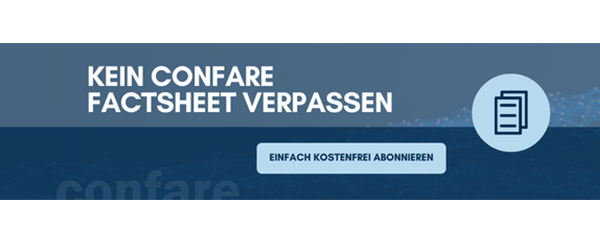OUT NOW in #ConfareBlog with Anita Fachs, Green Fox Academey: It’s crystal clear: digital literacy is a determining factor in the future of the labor market
It has become crystal clear: digital literacy is a determining factor in the future of the labor market. It is no longer a “nice plus” but more of a necessity in the profile of any employee.
In this #ConfareBlog, Anita Fachs from Green Fox Academy, a leading coding bootcamp in CEE – takes takes us through a journey of the current training and recruitiment world of coding. In addition to helping career changers become junior programmers, Green Fox Academy provides programs for enterprises to increase the digital knowledge of their current and future employees. Green Fox Academy also provides female-tailored programs. This, just like the Confare Female IT-Mentoring in Vienna, Frankfurt and Zurich delivers the needed support for women in the IT.
YOU can also support women in IT. You can now nominate yourself or a fellow female colleague for the #CIOAWARD 2023 in Vienna, Zurich or Frankfurt. The Award ceremony takes place as a significant part of the Confare #CIOSUMMITs, a networking opportunity with top CIOs from the DACH region.

What role does coding play in business and society?
Software development, automation and digitalization projects are boosting the transformation of the labor market as well. Technology affects each department in the company, from HR to marketing, from customer service to finance. To remain employable, the workforce needs to acquire digital skills, no matter which sector they work in.
While service provider companies are fulfilling a leading role in transforming business processes of big enterprises, digital transformation of the core business are becoming focus areas at big manufacturer companies as well. These processes further increase the demand for a workforce with digital literacy and programming skills. The level of digital penetration of society i.e. mobility skills towards IT, is becoming a key issue, especially among previously underrepresented groups such as women and people with disabilities. In addition, the digital transformability of a given company’s workforce also comes into view. The training of the existing workforce provides an opportunity to preserve the domain knowledge related to the core business, which, if supplemented with programming knowledge, can significantly increase the success of digitization projects.
What is the goal of Green Fox?
Our goal is to provide job-ready career changers for the B2B market and provide re- and upskilling programs for enterprises aiming to increase the digital knowledge of their current and future employees. In this way we can help them to keep pace with recent digital trends and to surmount the obstacles provided by digital transformation.
The origins of Green Fox lie in the experiences our founders had while living in the safe harbor of the technology bubble. Whilst they were enjoying great work conditions and a good quality of life, they saw smart, motivated and well-educated people around them struggling to find motivation and make a decent living. They soon realized this was a significantly broader social issue, and acquiring digital skills can be the key to getting a future-proof career. While having skilled employees and taking advantage of the opportunities offered by digitalisation, might be crucial for companies to remain competitive.
As an impact driven company we are aiming to increase the number of female tech talents in CEE markets. So far we achieved a 30% female ratio among our graduates, while 95% of them are still working in the field of IT and also planning to remain in this field.
We are also planning to kick off a custom bootcamp for people with diverse abilities.
Recruiting and retaining the right employees will be a particularly important topic in the coming years. How do you successfully deal with this challenge?
Education became crucial both in recruiting and retaining current and future employees. According to a survey conducted in Hungary among tech talents: employees are expecting training opportunities provided by their employees, also noted as an aspect which is taken into consideration in changing workplaces.
There is obviously an increased demand for medior and senior workforce, while their availability on the market is increasingly scarce; the targeted upgrading of existing junior employees to the medior level can be a competitive advantage for employers, but the continuous replenishment of junior developers must also be managed. We provide an internal mentoring service for the former, while internal academies, i.e. a corporate bootcamp tailored to the given company, can be a good strategy for filling up the junior workforce. With our partner company, Lufthansa Systems Hungary, we have been launching a bootcamp-type onboarding program for newly graduated university employees for seven years. Lufthansa Systems Hungary provides 80% of its junior workforce need this way.
Recently we ran a couple of pilot projects with some partner companies where upskilling of current employees became a strategic goal. For instance, we successfully closed a project where we had to upskill a group of manual testers to become automated testers.
In case of reskilling programs after measuring the motivation and competencies of the pool of employees, we can tell with a relatively high level of confidence which employees will be capable of becoming software developers. Based on the number of selected people and the technological stack that they should acquire to be job-ready developers, we are creating a customised course for them.
How important is digital literacy in the company and in society?
The level of digital literacy in society will define the competitiveness of the labor market in 2-3 years in our opinion, while at any company a high level of digital literacy is already essential to implement automation and digitalization projects successfully.
You are proud to have a high proportion of female graduates. How do you do it?
The short answer is that we are also running courses customized for female participants. We have to take into account all the circumstances and special life events which might have an impact on the level of dedication a mother with small children has..
Each and every class on all courses have their own psychologist mentors as well, who are supporting students with personal coaching sessions.
Besides that, events dedicated to females interested in our courses also help us to break down boundaries and concerns that are typical among women in relation to IT/programming.
There is a huge interest in these programs from women: we organize our Ladies’ Coding Night event with a full house every year. This year alone, more than 4,000 applications were received for our foundation course specifically for women, which ensures entry into the IT market. Lack of courage and stereotypes often hold women back from entering the IT market, but we provide them a safe environment at these programs to discover the world of IT.
What is the best way to support women pursuing a career in IT? What can be done better in society, in companies and as a manager?
Both companies and managers – who already work in the field of IT need to highlight and promote role models, share success stories of career changes into IT and show the particularly wide range of professions available: this is a job we all have to do and responsibility we all share. In society, we have to encourage young girls to be open to the field of IT and as parents, we have to give good examples.
Low and no-code platforms are finding their way into companies – who still needs to learn programming?
Even though big enterprises are working with similar business processes, these projects still require customization where programming is needed. Algorithmic thinking and the ability to recognize patterns are skills that are essential to become a fully functional Salesforce or ServiceNow Developer for example. As we see demand for these and other specific junior (eg. Data Engineer, DevOps Engineer) positions will further increase in the CEE region in the next couple of years.



